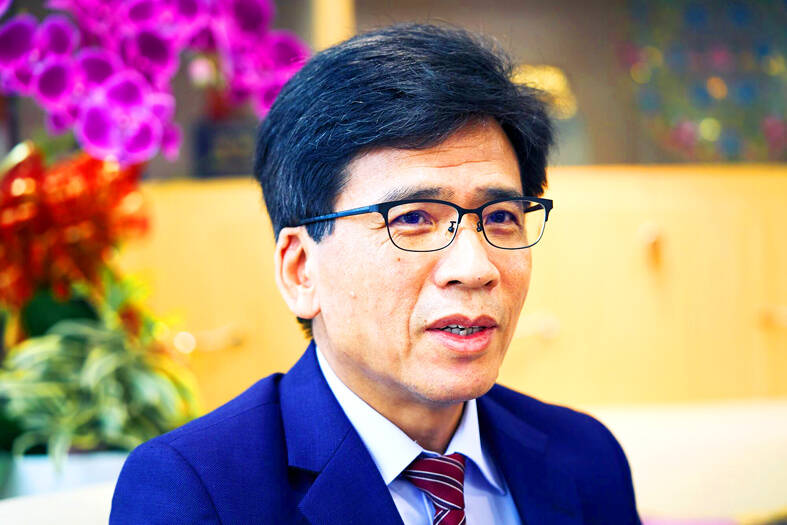Taiwan’s financial regulator has cautioned workers at its banks operating in China to be mindful of their comments, following Beijing’s decision to expand laws that threaten “separatists” from Taiwan with the death penalty.
“We have reminded our banks in China to care about their staff, and pay attention to their comments and behavior,” Financial Supervisory Commission Chairman Peng Jin-lung (彭金隆) said in an interview in Taipei on Wednesday.
“The regulator will look into it case by case if there is an issue,” he said.

Photo: Bloomberg, An Rong Xu
Taiwan’s financial institutions have gradually cut exposure to the world’s second-biggest economy to diversify amid US-China tensions and the COVID-19 pandemic, Peng said, adding that their investment in China has continued to drop as businesses are very sensitive.
Taiwanese banks’ exposure to China dropped to just 21 percent of their net value this year, from a peak of about 70 percent in 2014, Peng said.
However, it is unlikely that exposure would fall to zero, because financial institutions still need to serve Taiwanese businesses operating in the country.
To manage the risk of operating in China, the reserve requirement for loans in China is 50 percent more than for those in Taiwan, he said, adding that the non-performing loan ratios of the nation’s banks in China are very low.
The regulator aims to build Taiwan as one of Asia’s asset management centers, and plans to further ease rules on investments and products for wealth management business, after allowing some banks to sell structured products to their high-net-worth clients, he said.
“Many international asset management companies have offices in Taiwan, such as Blackrock, and we hope they can expand their local team as Taiwan has many investment opportunities, such as AI [artificial intelligence] and technology,” Peng said. “We hope they can innovate new products in Taiwan.”
Total assets under management in Taiwan amount to about NT$120 trillion (US$3.66 trillion), including bank deposits and insurance funds, Peng said.
The government plans to prioritize retaining the wealth of its citizens locally, along with attracting overseas funds when building Taiwan as an asset management center, he said, adding that the impact of geopolitical risks would be smaller that way.
“Just like Taiwan’s property market is booming, will foreigners dare to buy property?” Peng asked rhetorically. “Probably not, but it doesn’t make a difference to locals. We are practical and we will focus on retaining the local wealth.”

CAUTIOUS RECOVERY: While the manufacturing sector returned to growth amid the US-China trade truce, firms remain wary as uncertainty clouds the outlook, the CIER said The local manufacturing sector returned to expansion last month, as the official purchasing managers’ index (PMI) rose 2.1 points to 51.0, driven by a temporary easing in US-China trade tensions, the Chung-Hua Institution for Economic Research (CIER, 中華經濟研究院) said yesterday. The PMI gauges the health of the manufacturing industry, with readings above 50 indicating expansion and those below 50 signaling contraction. “Firms are not as pessimistic as they were in April, but they remain far from optimistic,” CIER president Lien Hsien-ming (連賢明) said at a news conference. The full impact of US tariff decisions is unlikely to become clear until later this month

With an approval rating of just two percent, Peruvian President Dina Boluarte might be the world’s most unpopular leader, according to pollsters. Protests greeted her rise to power 29 months ago, and have marked her entire term — joined by assorted scandals, investigations, controversies and a surge in gang violence. The 63-year-old is the target of a dozen probes, including for her alleged failure to declare gifts of luxury jewels and watches, a scandal inevitably dubbed “Rolexgate.” She is also under the microscope for a two-week undeclared absence for nose surgery — which she insists was medical, not cosmetic — and is

GROWING CONCERN: Some senior Trump administration officials opposed the UAE expansion over fears that another TSMC project could jeopardize its US investment Taiwan Semiconductor Manufacturing Co (TSMC, 台積電) is evaluating building an advanced production facility in the United Arab Emirates (UAE) and has discussed the possibility with officials in US President Donald Trump’s administration, people familiar with the matter said, in a potentially major bet on the Middle East that would only come to fruition with Washington’s approval. The company has had multiple meetings in the past few months with US Special Envoy to the Middle East Steve Witkoff and officials from MGX, an influential investment vehicle overseen by the UAE president’s brother, the people said. The conversations are a continuation of talks that

Alchip Technologies Ltd (世芯), an application-specific integrated circuit (ASIC) designer specializing in artificial-intelligence (AI) chips, yesterday said that small-volume production of 3-nanometer (nm) chips for a key customer is on track to start by the end of this year, dismissing speculation about delays in producing advanced chips. As Alchip is transitioning from 7-nanometer and 5-nanometer process technology to 3 nanometers, investors and shareholders have been closely monitoring whether the company is navigating through such transition smoothly. “We are proceeding well in [building] this generation [of chips]. It appears to me that no revision will be required. We have achieved success in designing